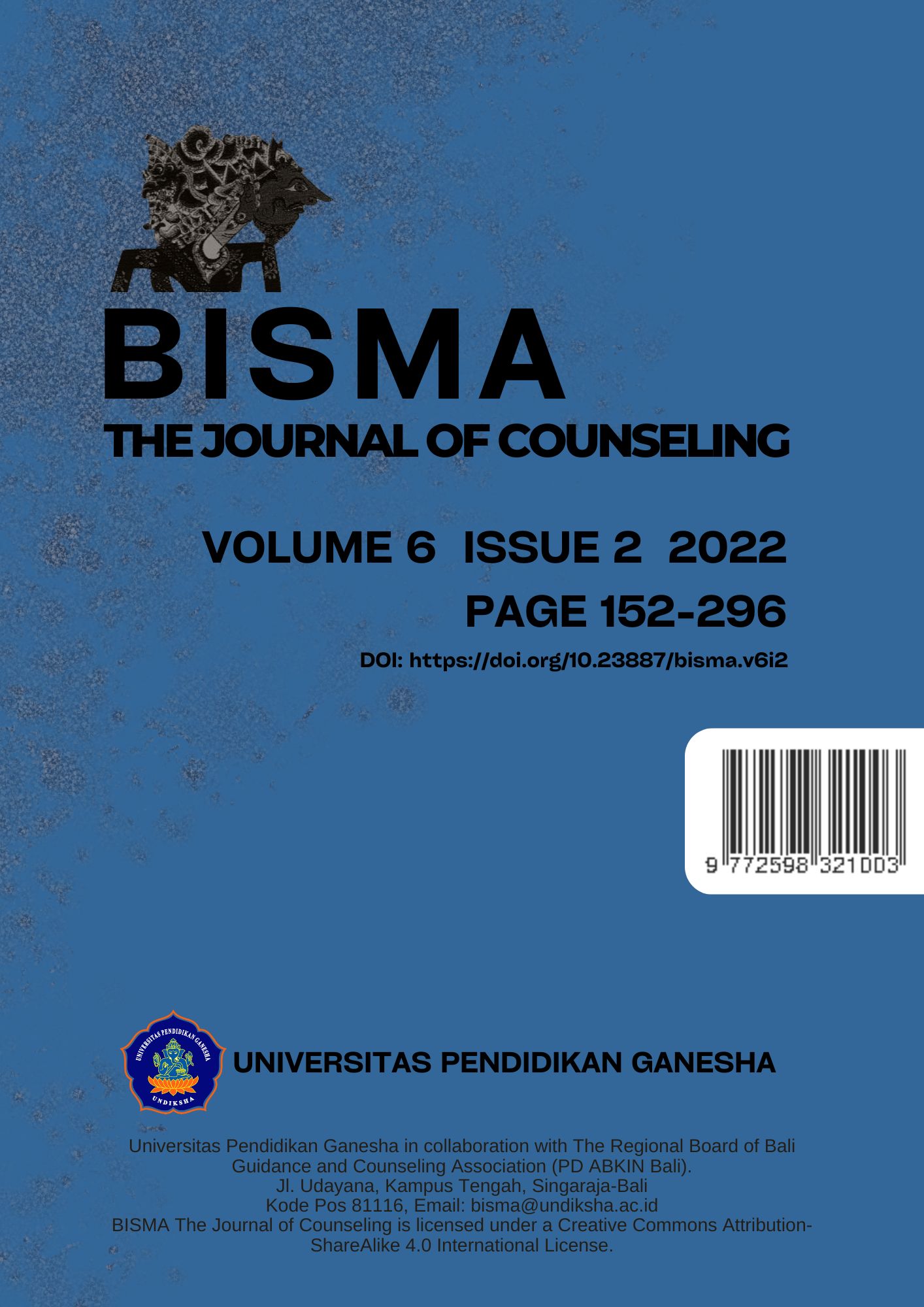Religiosity and Anti-Corruption Perceptions of Students
DOI:
https://doi.org/10.23887/bisma.v6i2.52454Keywords:
Anti-Corruption Perception, Religiosity, Students, psychology of corruptionAbstract
Students are the future cadres of the nation, but not infrequently students behave dishonestly in academic life on campus. Continuous efforts are needed to build students' anti-corruption perceptions so that in the future they will not behave in corruption. religiosity is religiosity that includes various dimensions that not only occur when a person performs ritual behavior (worship), but also performs other activities.
This study aims to see the relationship between Religiosity and Anti-Corruption Perceptions of Students, this correlational study uses a religiosity scale and an anti-corruption perception scale as a data collection tool. Respondents of this study were students of the Faculty of Economics and Social Unjaya who were selected by purposive sampling technique and 132 respondents were collected. The results showed that there was a positive relationship between religiosity and anti-corruption perception, the higher the student's religiosity, the higher the anti-corruption perception. The religiosity variable contributed 43% to the anti-corruption perception variable.
References
A Del Castillo, F., Del Castillo, C. D., & Corpuz, J. C. (2021). Dungaw: Re-imagined religious expression in response to the COVID-19 pandemic. Journal of religion and health, 60(4), 2285-2305.
Abdullah, M. A. (2020). The Intersubjective Type of Religiosity: Theoretical Framework and Methodological Construction for Developing Human Sciences in a Progressive Muslim Perspective. Al-Jami'ah: Journal of Islamic Studies, 58(1), 63-102.
Abdullah, T., & Karim, M., R. 1989. Metodelogi Penelitian Agama: Sebuah Pengantar. Yogyakarta: Tiara Wacana
Ancok, D., Suroso, F., & Ardani, M. (2001). Psikologi islami: Solusi islam atas problemproblem psikologi. Pustaka Pelajar.
Azwar, S. 2011. Metode Penelitian Edisi I Cetakan XII. Yogyakarta: Pustaka Pelajar
Glock, C. Y., & Stark, R. (1965). Religion and society in tension. Rand McNally.
Heryadi, A., & Jayanti, A, M. 2021. Persepsi Anti Korupsi dan Kejujuran Akademik Mahasiswa. Peneltian: Fakultas Ekonomi dan Sosial Unjani Yogyakarta. Laporan Penelitian
Heryadi, A., & Yuliasari, H 2019. Indeks Perilaku Anti Korupsi Mahasiswa. Peneltian: Fakultas Ekonomi dan Sosial Unjani Yogyakarta. Laporan Penelitian.
Jumriani, J., Abbas, E. W., Isnaini, U., Mutiani, M., & Subiyakto, B. (2022). Pattern Of Religious Character Development at The Aisyiyah Orphanage In Banua Anyar Village Banjarmasin City. AL-ISHLAH: Jurnal Pendidikan, 14(2), 2251-2260.
La Ferle, C., & Muralidharan, S. (2019). Religion in domestic violence prevention PSAs: The role of religiosity in motivating Christian bystanders to intervene. Journal for the Scientific Study of Religion, 58(4), 874-890.
Lindsey, T., & Pausacker, H. (2020). Crime and punishment in Indonesia. In Crime and Punishment in Indonesia (pp. 1-17). Routledge.
Ludigdo, U., & Afala, L. O. M. (2021). Memotret Potensi Korupsi di Kalangan Mahasiswa. Malang: Universitas Brawijaya Press.
Mumtazah, H., Rahman, A. A., Sarbini. 2020. Religiusitas dan Intensi Anti Korupsi: Peran Moderasi Kebersyukuran. Jurnal An-Nafs: Kajian Penelitian Psikologi 5 (1). Doi: 10.33367/psi.v5i1.1122
Nashori, F., & Mucharam, R, D. 2002. Mengembangkan Kreativitas Dalam Perspektif Psikologi Islam. Yogyakarta: Menara Kudus
Pratisto, A. (2005). Cara Mudah Megatasi Masalah Statistik dan Rancangan Percobaan dengan SPSS 12. Jakarta: Elex Media Komputindo
Rokhmah, S, N., & Putri, J, T. 2018. Pengaruh Role Model dan Religiusitas Terhadap Perilaku Antikorupsi pada Mahasiswa Organisatoris di Jawa Timur. Jurnal Psikologi dan Psikologi Islam (JPPI), 15(2), 26-33.
Sommer, U., Bloom, P. B.-N., & Arikan, G. (2013). Does faith limit immorality? The politics of religion and corruption. Democratization, 20(2), 287–309. https://doi.org/10.1080/13510347.2011.650914
Sugiono. 2017). Statistika untuk Penelitian. Bandung: CV Alfabeta
Triana, N., & Heryadi, A. (2020). Kecintaan Pada Uang dan Persepsi Anti Korupsi. Psyche 165 Journal, 13 (1), 44-52
Ulah, A. & Shah, M. 2013. Does Pakistani Society Accept Corruption as a Changed Value with Reference to Religious Perspective?. Global Disclosure of Economics and Business, Vol. 2, No . DOI: 10.18034/GDEB.V2I1.191
Winkelman, M. J. (2022). An ethnological analogy and biogenetic model for interpretation of religion and ritual in the past. Journal of Archaeological Method and Theory, 29(2), 335-389.
Yahya, K, K., Yean, T, F., johari, J., & Saad, N, A. 2015. The Perception of Gen Y on Organizational Culture, Religiosity and Corruption in Malaysian Public Organizations. Procedia Economics and Finance 31, 251 – 261. https://doi.org/10.1016/S2212-5671(15)01227-7
Downloads
Published
Issue
Section
License
Copyright (c) 2022 Adi Heryadi, Egi Prawita, Alvira Laylhi Shoma Hikma Wirandha

This work is licensed under a Creative Commons Attribution 4.0 International License.









